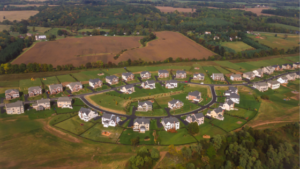Advancing regenerative farming practices is not enough. A critical companion step is to protect farmland.
With every acre of farmland we lose in the United States, we lose the opportunity to capture carbon and experience the other benefits of regenerative agriculture.
Furthermore, every acre of farmland lost to development results in more pressure on the remaining farmland to produce the food that we need—and the more pressure we put on farmland to produce food, the harder it is to use that land to provide critical environmental services.
Beyond this, farmland protection is the only way of ensuring that the benefits of regenerative agriculture endure. The value of these practices disappears if the land is converted into house lots or a shopping center.

Finally, there is one more way protecting farmland has a positive climate impact. Low-density development generates more emissions than compact development or farmland. AFT studies in both New York and California show that protecting farmland and limiting sprawling development can help curb one of the largest sources of carbon emissions: transportation. In New York, if the annual loss of farmland were reduced by 80 percent, that could reduce emissions equal to removing one million cars from the road.
AFT’s research informs farmers, ranchers, and policymakers about the threats of farmland conversion and the risks posed by climate change. Our work with the U.S. Climate Alliance enables us to work directly with states on developing solutions.

